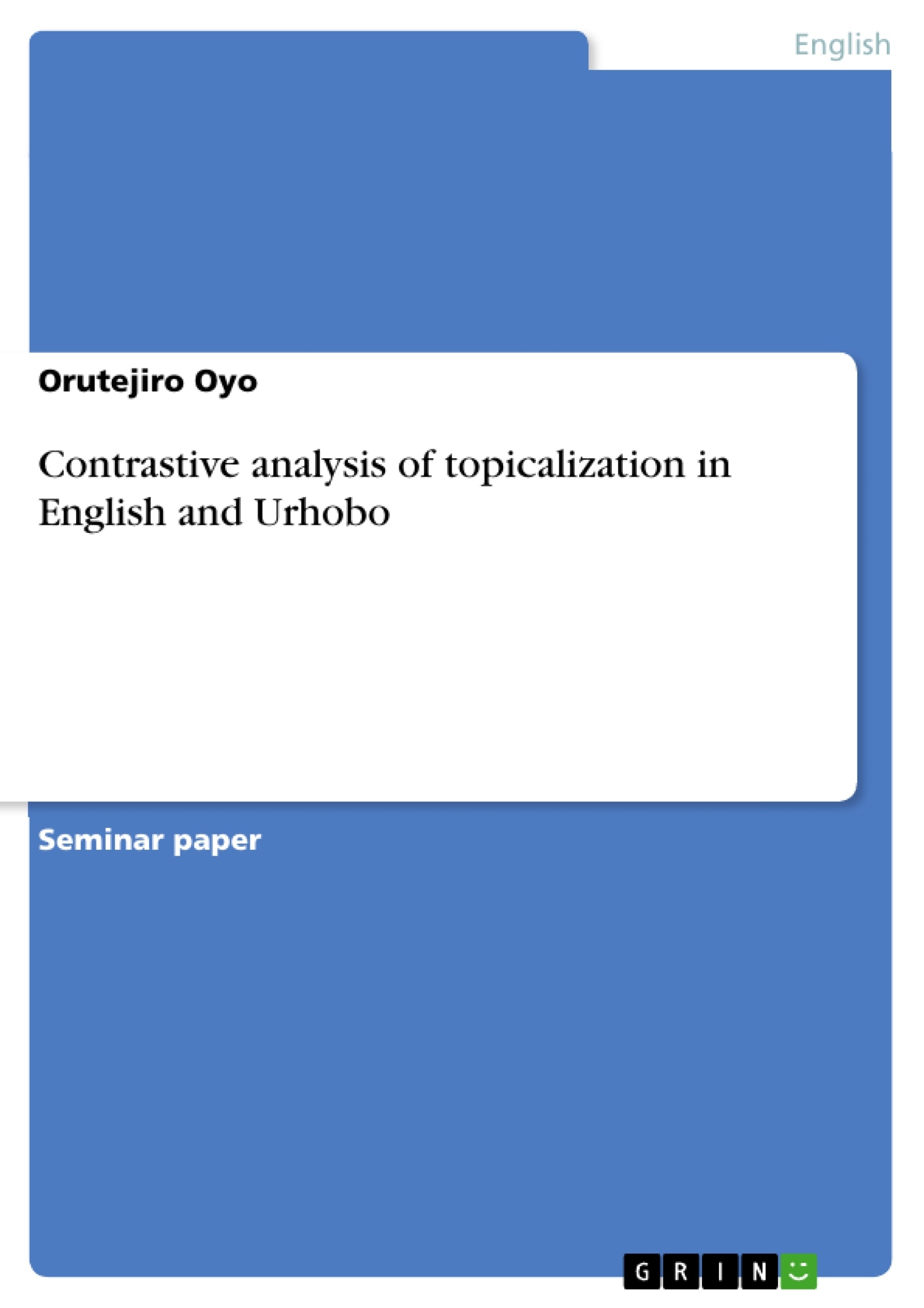This research is a contrastive analysis of topicalization in English and Urhobo. Urhobo is a Southwestern Edoid Nigerian language.
Its objective is to explore topicalization in English and Urhobo languages using the basic Chomsky’s Phase theory model to establish points of divergence while noting convergence in the derivation of the investigated phenomenon to highlight areas of learner’s difficulty which will be useful to teachers as best strategies in the teaching process.
The study uses two sources of data, namely primary and secondary sources. Through observation and textbook, internet and dictionaries, data was collected and analyzed. The theoretical framework adopted for the study is the Phase Theory. The data analysis posited that the theory is a suitable mechanism for the analysis of the investigated structure, lexical items are assigned to probes because of the features they must realize the goal and every syntactic operation is done in phases which is the only level of representation.
Before delving into the discussion of the above topic, it is pertinent to try to get clear in our minds the sense in which the word ‘transformation’ is used in this study, since different people have different notions of the term ‘transformation’. The English language like any other language has rules of syntax. Many languages including English have a transformation that moves constituents, which are strings of one or more words that syntactically and semantically behave as a unit, from one part of the phrase structure to another. This means that some sequence of words in a particular sentence can occur in a different position in the same sentence
Inhaltsverzeichnis (Table of Contents)
- Abstract
- Introduction
- Review of Related Literature
- Contrastive Analysis
- Theoretical Framework
- Phase Theory: A Brief Review
- Role of Features in Phase Theory
- Delete or Crash: Uninterpretable Features
- Materials and methods
- Data presentation and analysis
- Noun Phrase Preposing
- Direct Object Preposing
- Verb Phrase Preposing
- Topic associated with movement
- Left isolation
- Conclusion
- References
Zielsetzung und Themenschwerpunkte (Objectives and Key Themes)
This research aims to conduct a contrastive analysis of topicalization in English and Urhobo, a Southwestern Edoid Nigerian language. The study utilizes Chomsky's Phase theory model to explore points of divergence and convergence in the derivation of topicalization in both languages. This analysis aims to highlight areas of difficulty for learners and provide teachers with effective strategies for teaching.
- Topicalization in English and Urhobo
- Chomsky's Phase theory model as a framework for analysis
- Points of divergence and convergence in the derivation of topicalization
- Identifying learner difficulties and effective teaching strategies
- Utilizing primary and secondary data sources for analysis
Zusammenfassung der Kapitel (Chapter Summaries)
- Abstract: The abstract provides an overview of the research, highlighting its objective to analyze topicalization in English and Urhobo using Chomsky's Phase theory model. It mentions the data sources and theoretical framework employed, emphasizing the aim to identify learner difficulties and offer practical teaching strategies.
- Introduction: This chapter introduces the concept of topicalization and its significance in both English and Urhobo. It discusses the importance of understanding the syntax and transformation rules of both languages, particularly in relation to the concept of 'transformation'.
- Review of Related Literature: This chapter reviews existing literature on topicalization, exploring various perspectives and theories. It examines the concept of 'topic construction' and 'left dislocation', highlighting the different approaches to analyzing these phenomena. It also delves into Chomsky's proposal of a 'topic position' in the sentence structure, emphasizing its role in accommodating embedded topics and topic recursion.
- Contrastive Analysis: This chapter explores the field of contrastive analysis in linguistics, emphasizing its systematic and empirical methodology. It discusses the importance of understanding language structure and providing explanations for how language functions, rather than simply promoting its use.
Schlüsselwörter (Keywords)
The primary keywords and focus topics of this research include: topicalization, English, Urhobo, Phase theory, Chomsky, contrastive analysis, learner difficulties, teaching strategies, syntax, transformation rules, features, phonological form, logical form.
- Quote paper
- Orutejiro Oyo (Author), 2022, Contrastive analysis of topicalization in English and Urhobo, Munich, GRIN Verlag, https://www.grin.com/document/1176219




